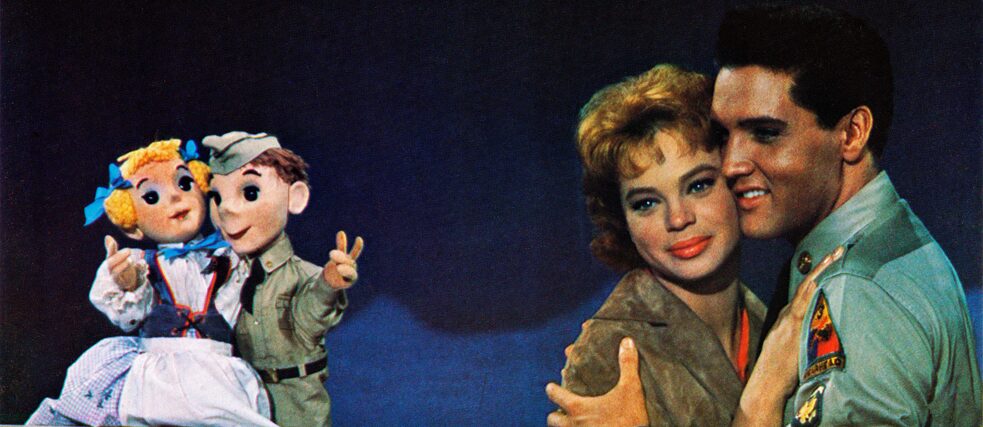SoundBites
Zero-Hour German Folk-Pop

In 1960, Elvis Presley is the most famous pop star in the world. In one of his films, he sings a German folk song that goes on to sell over a million copies.
In the 1960 film G.I. Blues, Elvis Presley plays an American soldier stationed in Germany – as he was himself in the two years before. In one scene, he goes on a romantic boat trip on the Rhine with his love interest, dancer Lili from the Frankfurt nightclub Café Europa, which was also the German title of the film. The couple stumble upon a traditional puppet show for children. When the gramophone breaks down and the music starts to die, Elvis, aka tank crewman Tulsa McLean, comes to the rescue, singing a suggestive, flirtatious half-English, half-German version of the old Swabian folk song Muss i denn, muss i denn zum Städtele hinaus with the female puppet character.
Presley’s sentimental rendition of the song shot to the top of the British singles charts as Wooden Heart in 1961, as did Joe Dowell’s cover in Elvis’ native America, and Tonio Areta’s translated version Corazón de Madera in Spain the same year. In Germany, over 400,000 copies of Wooden Heart sold almost instantly – much to the displeasure of tradition-conscious radio stations like Bayerischer Rundfunk, which declined to play Elvis’ song since it preferred “seriously cultivated” tradition over the “schmalzification of German folk songs”. But the fact remains that Muss i denn... became the best-known German folk song nationally and internationally. In the following decades, it was covered by numerous German-singing Schlager and chanson stars such as Heino, Mireille Mathieu, Nana Mouskouri, Roy Black, Karel Gott and Hannes Wader. Over 40 cover versions of the song are believed to exist. Even Chubby Checker produced a somewhat sluggish adaptation known as Twist doch mal mit mir in 1962, which had none of the rousing dance floor energy of his usual twist hits.
But perhaps with good reason since the original Muss i denn... is about a young man saying a sad goodbye to his girlfriend. He generously promises to marry her when he returns a year later, but admits that in the town there are “lots of pretty girls”. The Swabian folk tune-inspired song composed by Friedrich Silcher was published for the first time in 1827 and enjoyed popularity as a hiking and soldier’s song not only in Germany but soon also internationally, as proven by Henry William Dulcken’s 1856 English translation Must I, then? Must I, then? From the town must I, then?.
Sei mir gut, sei mir gut
Sei mir wie du wirklich sollst
'Cause I don't have a wooden heart
Were the makers of G.I. Blues aware of these historical connections when they hired Ludwig Stössel – an Austrian-born Jewish actor who escaped to the US – to play the puppeteer in the described film scene? Perhaps not. But the fact that Stössel, appearing here in his last film, uses his squeezebox to dictate the rhythm of the song for a (performing and real-life) G.I. and superstar is definitely a clear signal of who should have interpretative sovereignty over the title from now on.